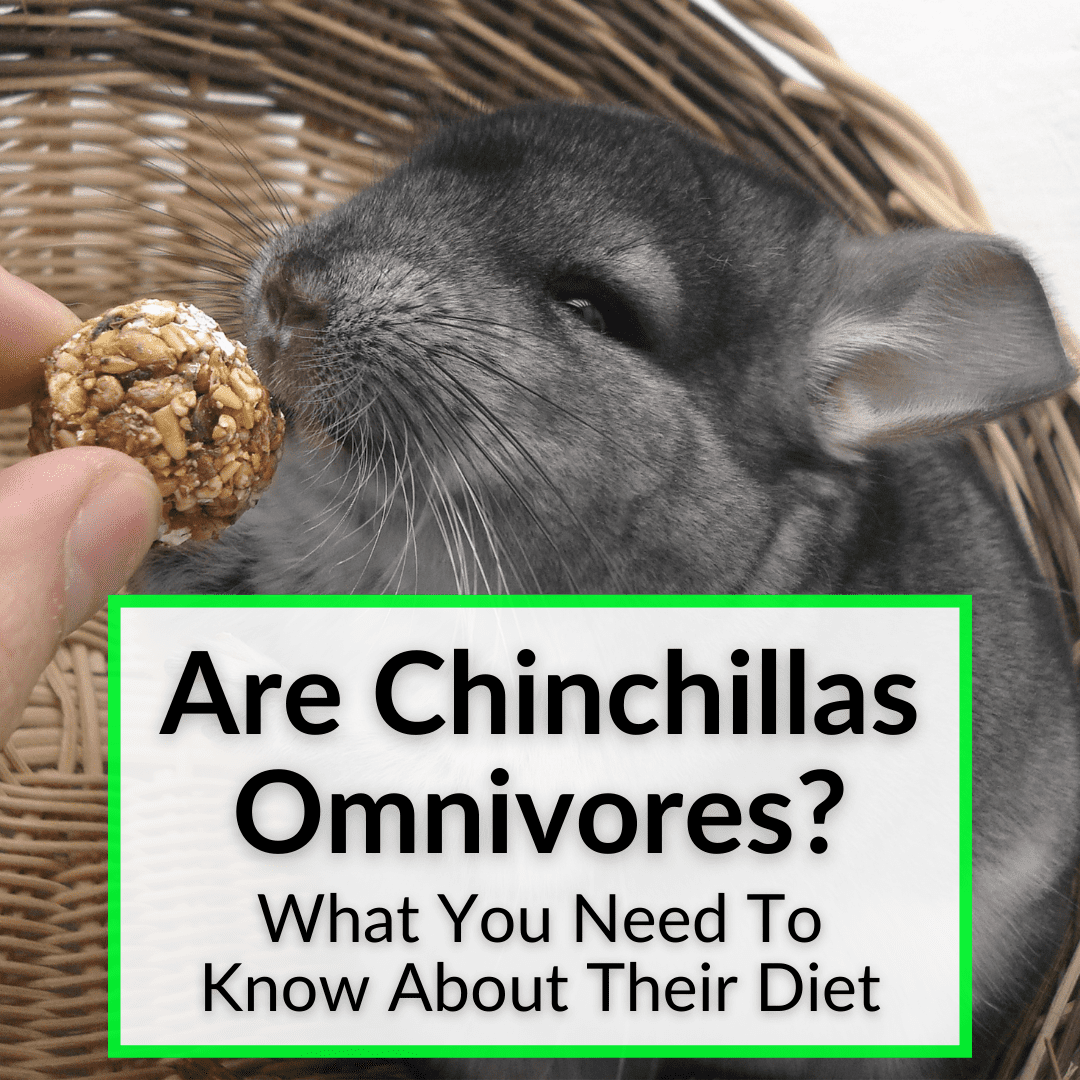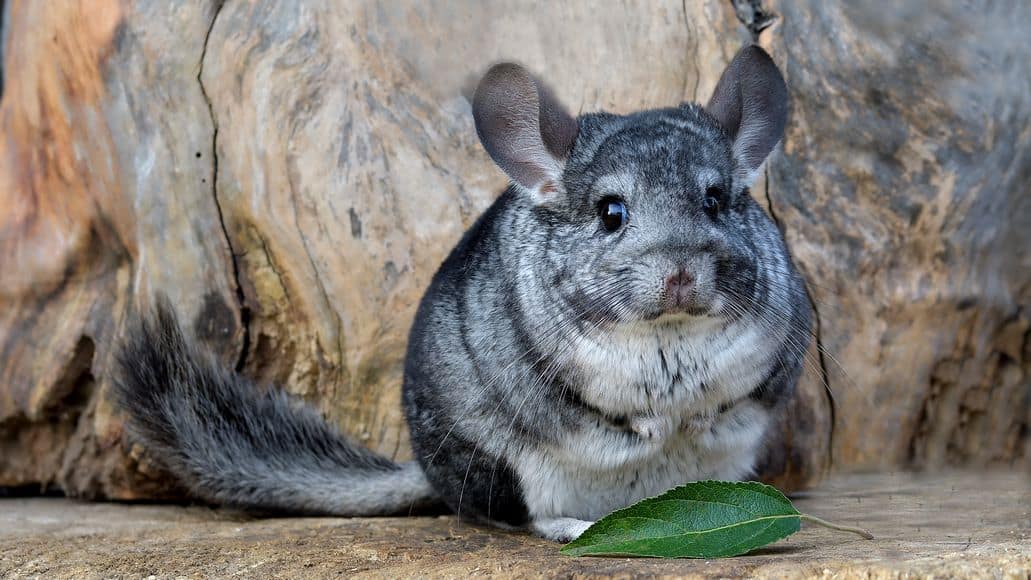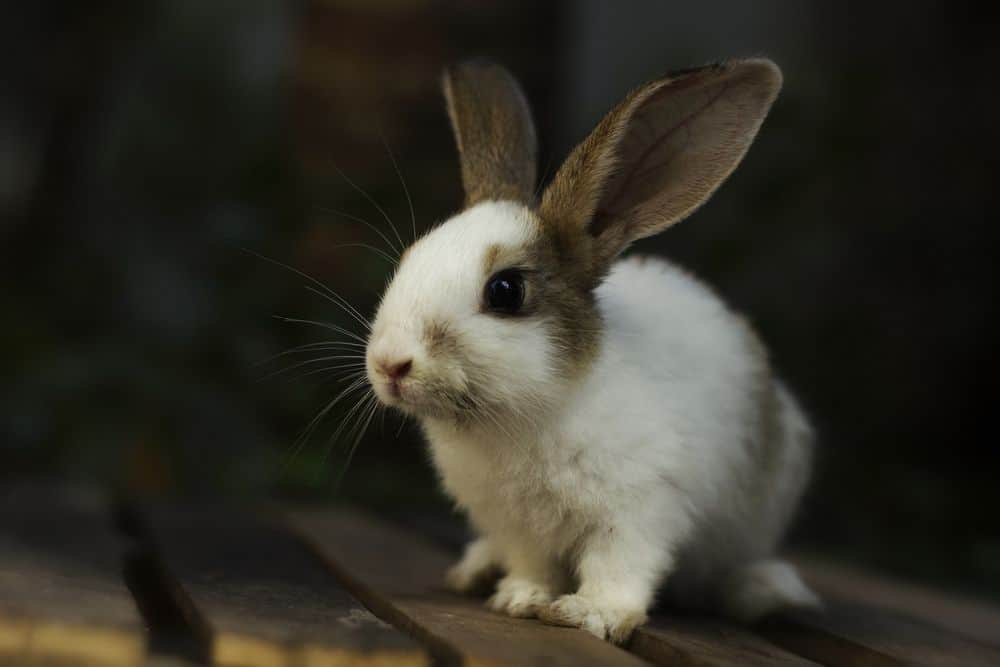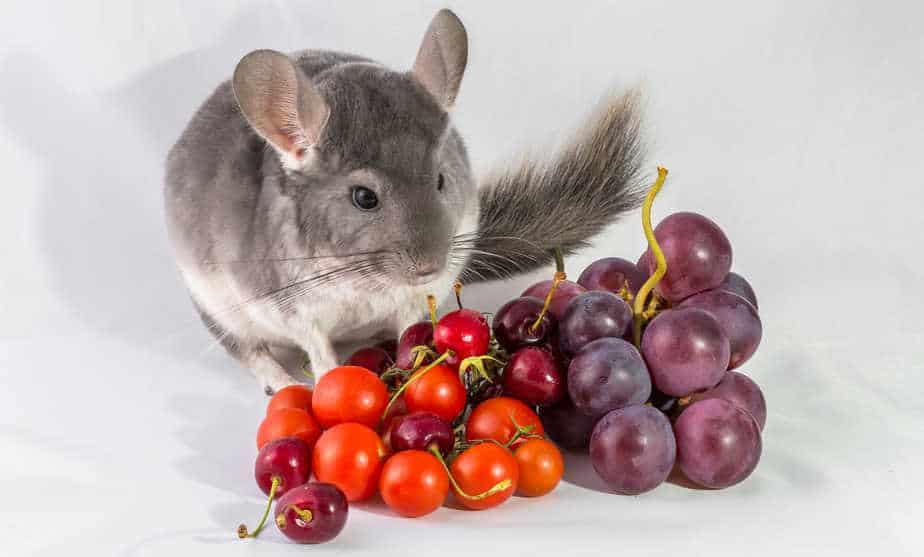
At least they should. We’ll cover that below.
But in the wild, they eat a larger variety of things.
That includes a lot of foods that aren’t exactly healthy for them.
Not so different from us humans, I suppose.
But how big a variety do they eat? Are chinchillas omnivores or do they only eat plants?
Keep reading to learn exactly what chinchillas eat in the wild, and what you should feed them in captivity. The two are very different, because we know exactly what is best for them, while they eat anything they can find.
Contents
Are Chinchillas Omnivores?
Yes, chinchillas are omnivores. These small animals feed on plants and meat, but their diet mainly consists of vegetation and seeds.
Chinchillas in the wild won’t go on the hunt looking for meat, but they will eat insects or bird eggs, if they come across them. When it comes to vegetation, they eat different types and parts of plants, including the following.
Is A Chinchilla A Herbivore Due To Its Preference For Plants?

The chinchilla is primarily an herbivore. But because they occasionally eat insects or eggs, they are omnivores, not herbivores.
Chinchillas look for foods that offer them a high amount of fiber. In the wild, they will look for herbs and other things that are rich in fiber.
When domesticated, the ideal diet for them as pets is Timothy hay and specially formulated pellets. The combination of these two foods contains all the nutrients chinchillas need to thrive and live a healthy life.
In addition, you can also give your pet chinchilla the occasional treat, like different vegetables, fruits, and snacks. You should give these in a limited quantity, since they often contain sugar or other components that can be hard on these tiny rodents’ sensitive digestive systems.
You should always check the nutritional value of any item you want to feed your pet. When in doubt, ask your vet or don’t feed the item. You can also read our articles on vegetables that are safe and on fruits you can give your chin. We’ll go into a bit of detail on that next, as well.
What Fruits And Vegetables Are Safe For Chinchillas?
There is a decent range of fruits and vegetables that you can feed your chinchilla. They are one human food chinchillas can eat.
Some of them are good for your pet, and others are something they may enjoy, but don’t offer much nutritional value. As mentioned above, feed all in moderation only.
The main reason you need to keep the amount you give low is the sugar. All fruits and vegetables have some and many have quite a bit. These are some of the best fruits and vegetables you can feed to your chinchillas.
It is better to avoid feeding sugary fruits altogether, like apples or particular berries. They have too many calories from sugar and simply don’t offer a high nutritional value for a chinchilla. There is no real benefit of feeding these fruits and the sugar can cause digestive issues.
Foods with high calorie and sugar levels can also result in obesity and diabetes. That is why it is best to stick to the safer vegetables and other safe treats like rose hips or oats.
Can You Feed Rodent Food Or Rabbit Food To Chinchillas?

Chinchillas can eat some types of rodent food that is meant for other species. A common example of such food is hay. Different species do best with different types of hay, but just about any hay is fine for a variety of animals like rabbits, mice, chinchillas or viscachas.
If you are looking to use pellets meant for other species, you need to find one that fulfill a chinchilla’s nutritional requirements. Pellets for chinchillas have certain minerals and vitamins that rabbit pellets, guinea pig pellets, or pellets for other animals just don’t provide.
Are Chinchilla Meat Eaters?
Chinchillas will eat eggs and insects (not really a meat, but still), but they don’t generally seek out these foods. They may be omnivores, butt hey definitely fall more on the herbivore side than the carnivore side.
That said, just like it does with us humans, the favorite food item can vary from one chinchilla to another. These animals have their individual preferences regarding what food items they like the most.
But overall, chinchillas prefer to eat food items that are rich in fat and have a high amount of carbohydrates. I guess that makes them a lot like us. And like us, that means they love eating things that aren’t exactly the best for their health.
They enjoy foods and snacks with a high fat content, like sunflower seeds. But these types of food are not good for their health in the long run, since they can lead to obesity and diabetes. Read “Can Chinchillas Eat Sunflower Seeds?” for more.
Another vital point to note is that foods high in calories are not nutrient-dense. This could cause your pet chinchilla to suffer from nutrient deficiencies, if it is only eating food items high in calories.
However, these types of foods can work wonders, if your chinchilla is weak and skinny. High-calorie foods do an exceptional job, if you want to increase your pet’s weight, inthe same way they are great at increasing our weight (just ask my scale).
If you are not sure what your pet chinchilla’s favorite food item is, you can simply conduct experiments. Give it a few different options and see what it responds to the most.
Once you find their favorite food, you can give it to them as a treat from time to time. Unless your pet’s favorite food happens to be hay or pellets. Wouldn’t that make things convenient!
Foods To Avoid Giving Your Chinchilla

Not every food item is suitable for chinchillas. As mentioned, many can cause digestive issues. But some can also have serious health implications later on in your pet’s life.
The very first thing you should avoid giving your chinchilla are most items other than fruits, vegetables, or certain other safe things like some seeds, nuts or grains. Primarily, you should not give them meat, dairy products, or any type of processed food items.
The main reason is that these products are not a part of their natural diet. They don’t have the necessary enzymes to digest these food items. This can wreak havoc on their digestive system, causing issues like diarrhea and other severe health complications.
But, as mentioned before, it is important to note that not all fruits and vegetables are safe for chinchillas either. You should avoid giving items that are sugary and/ or high in fat.
Here are some of the fruits and vegetables that are bad for chinchillas and that you should never feed them as a result, unless it is just a tiny amount.
- Spinach
- Rhubarb
- Peas
- Lettuce
- Corn
- Cabbage
- Broccoli
- Blueberries
- Avocado
- Asparagus
- Apples
These are just a few food items that your chinchillas should never eat. In addition to those, it is also best to avoid any nuts or seeds that are high in fat, like peanuts or sunflower or pumpkin seeds.
Though these animals eat seeds in the wild, they don’t contain the same amount of fat that is in sunflower seeds or peanuts. Of course, you can feed them these things, but it is best not to, even in moderation.
Another thing to beware of is that parts of certain plants are great, while other parts of the same plants are something you should avoid. Dandelions are a great example.
Can chinchillas eat dandelion flowers? They can, but it is best to avoid them. However, dandelion leaves are an excellent source of nutrition for chinchillas, and they love the flavor too. Dried leaves are better than fresh.
When it comes to hibiscus, the flowers are great. Chinchillas can eat dried hibiscus flowers for a tasty and healthy treat. Even fresh flowers are fine, but dried are definitely better. And also much easier for you.
How Often Should You Feed Chinchillas?
If you have a pet chinchilla in your home, I suggest that you feed it twice a day. But you can keep the hay feeder stocked permanently. You can learn everything you need to know about properly caring for your chinchilla in our comprehensive article on chinchilla care.
Chinchillas in the wild usually look for food twice a day: in the evening and the morning. However, they are continuously feeding on different things throughout their day. That is why I like to feed my pet pellets twice a day, but keep hay in the feeder (and water in the bottles) at all times.
Chinchillas Are Omnivores: Final Thoughts
Chinchillas are technically omnivores, because they occasionally eat eggs and insects. But they primarily eat vegetation and seeds, so they are mostly herbivores.
In captivity, you want to feed your pet chinchilla a diet of chinchilla pellets and Timothy hay. These contain all the nutrition these animals need. You can give the occasional treat, but the vast majority of their calories should come from those two food sources.
Leave a Reply